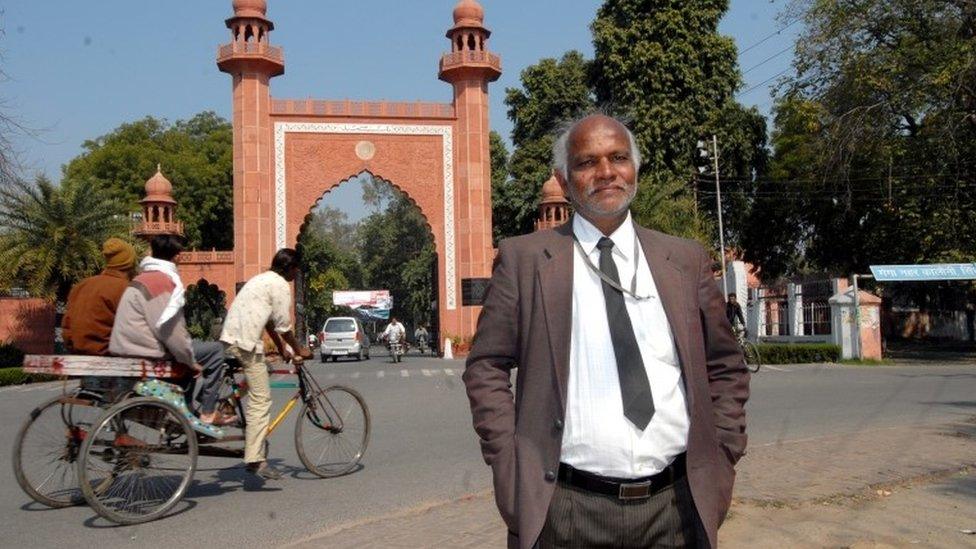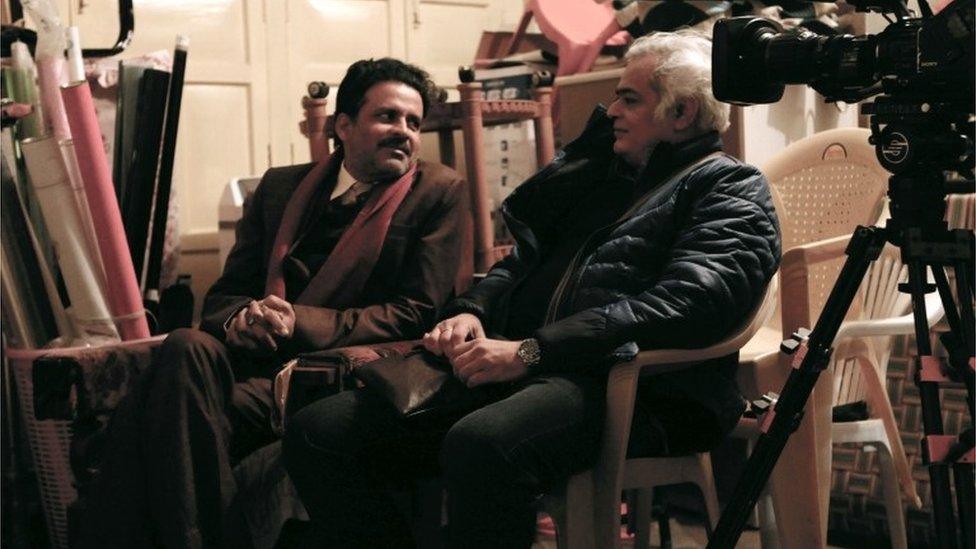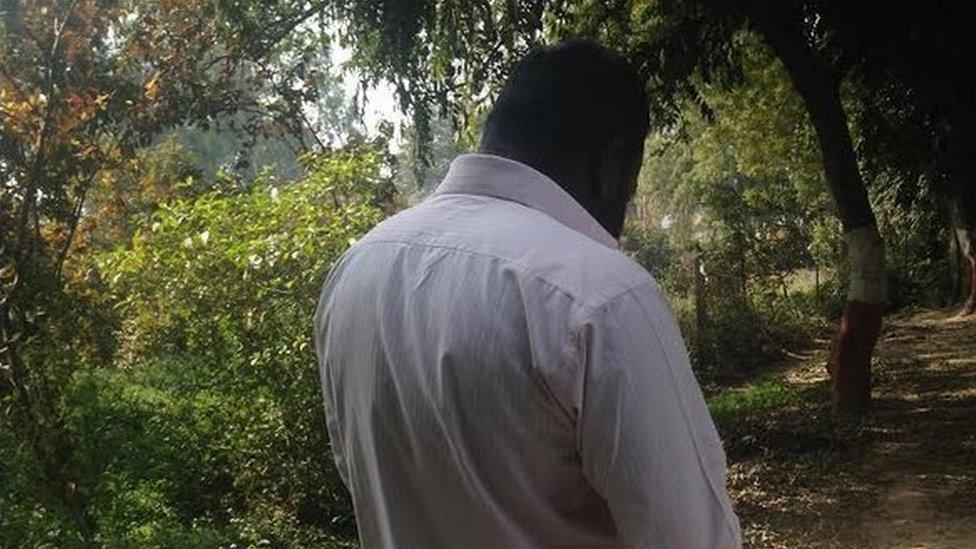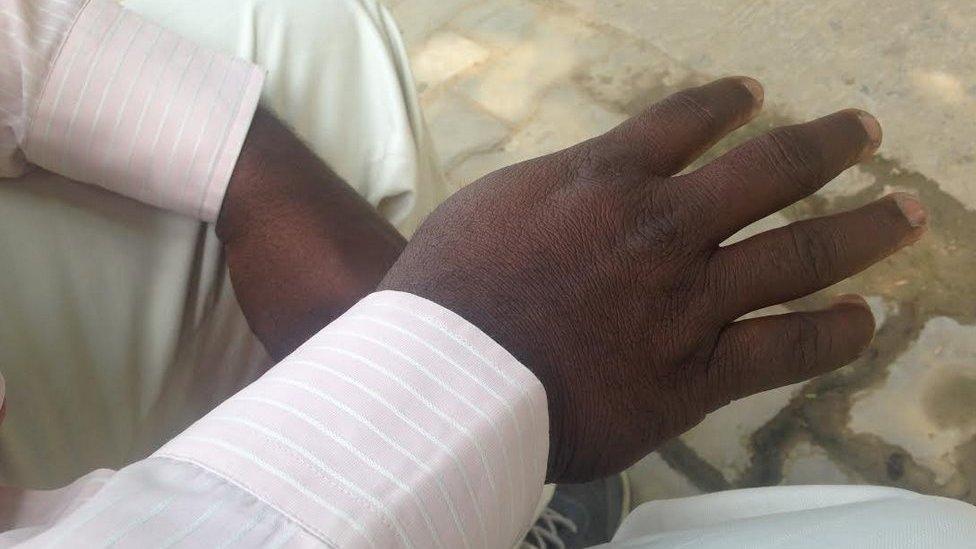Why a gay Indian professor's death inspired a film
- Published

Bollywood film Aligarh is based on the story of university teacher Shrinivas Ramchandra Siras
A professor from India's prestigious Aligarh Muslim University (AMU) died in 2010 after a video of him having sex with another man became public. Six years later, a Bollywood film revolving around his story is released on Friday. BBC Hindi's Vineet Khare spoke to the professor's partner and the TV news crew which filmed the controversial video.
The crew from a local TV station in the northern city of Aligarh secretly filmed Shrinivas Ramchandra Siras, then 64, having sex with rickshaw puller Abdul (name changed) in his house inside the university campus on 8 February 2010.
The video led to public condemnation of Prof Siras by conservative religious groups.
The university administration suspended him and asked him to leave the campus. He was found dead in his apartment two months later.
His death drew widespread criticism of the university authorities. Many saw it as yet another case which highlighted the difficult lives of homosexuals in India.
A colonial era law criminalises homosexuality in India. Also, in deeply conservative India, same-sex relationships are taboo and many people still regard them to be illegitimate.
'Angry, ashamed'
The professor was in his bedroom with Abdul when local cable TV journalists Ashu Rizvi, Adil Murtaza and Siraj barged into his house.
The crew had already filmed the professor having sex with Abdul and wanted to confront the two men.
The video, given to the BBC by the university, shows Prof Siras repeatedly pleading with the three men to stop filming.
The professor, in an interview to TV channel NDTV, external, later called the filming an "encroachment on my privacy" and added that he felt "angry", "ashamed" and "insulted".

Hansal Mehta (right) with actor Manoj Bajpayee on the set of Aligarh
Abdul still lives in constant fear of losing his livelihood, being recognised on the streets or even killed for being the professor's gay partner.
The "horrible" incident has stayed with him ever since and he misses his "partner".
"He loved me," says the father of five daughters, adding that "a bit of greed" may have guided his relationship with the professor.
"Had he been alive, my children would be studying in good schools. I would be running a business," he says.
Abdul was born in Delhi in 1981, but his family moved to Aligarh, a three-hour drive from the national capital, in 1992.

Abdul still fears for his safety
Poverty forced him to become a rickshaw puller in his teens to contribute to the family's income.
He met Prof Siras in 2009 outside the university's arts faculty, one of the many gathering spots for rickshaw pullers.
He "enjoyed" his relationship until the video filming incident happened.
He said he was "shocked and scared" and left Prof Siras' house after the incident. That was the last time they saw each other.
Two months later, he heard on the news that Prof Siras had died. He was told his name was flashing across the media. He feared he would be blamed for the death.
He became increasingly worried when police began interrogating him. He said he was "frustrated" and one day he doused himself with kerosene and lit a match.
His wife saved his life.
"I thought it was better to die. I had done nothing wrong. My only fault was that I had shared a relationship with Prof Siras."
'Genuine story'
He has been living in fear since. He is alert at all times, always looking around suspiciously for anyone directly approaching him.
"If I die, who will look after my daughters? You know how women are looked down in our society," he said.
Life has changed for the three journalists as well.
Ashu Rizvi, who ran a cable news business in 2010, is now in the real estate sector. He said Adil Murtaza now worked with an Urdu daily in Lucknow, the capital of the northern state of Uttar Pradesh, while Siraj worked at a meat factory.
Over the phone, Mr Rizvi told me that they saw it as a "legitimate story of uncovering the exploitation of a rickshaw puller by a university professor".

Abdul says Prof Siras loved him
He sees homosexual relationships as "wrong in a country like India".
Some media reports had suggested that the university had a hand in the "sting operation" against the professor - an allegation denied by the authorities.
Mr Rizvi also denied that he was paid money and insisted that he saw it as a genuine story.
"We were tipped off by the rickshaw puller himself that he was being exploited by the professor. It was news, but we were targeted," he said.
Abdul denied that he had approached the media.
"I never approached anybody. I still don't want any media attention," he said.
But he lives with the hope that one day some financial benefits may come his way for being the "professor's lover".